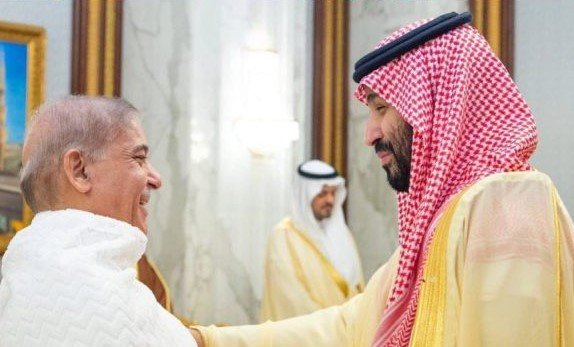Islamabad courts Riyadh’s influence to project diplomatic clout amid South Asia tensions
Prime Minister Shehbaz Sharif on Wednesday struck a confident tone about Pakistan’s growing diplomatic relevance, telling Saudi Arabia’s envoy that Islamabad is entering its United Nations Security Council presidency with clear-eyed ambition — and with Riyadh’s support firmly in its corner.
The message, delivered during a meeting with Saudi Ambassador Nawaf bin Said Al-Maliki at the Prime Minister’s House, placed special emphasis on Saudi Arabia’s weight in the region. In what sources described as a “cordial yet pointed” exchange, Sharif aligned his government’s vision for peace — particularly with archrival India — to Saudi Arabia’s own long-term stability agenda.
A Delicate Moment for Islamabad on the World Stage
Pakistan assumed the rotating presidency of the UN Security Council for the month of July — a moment Sharif isn’t letting go to waste.
It’s the kind of international spotlight Islamabad hasn’t enjoyed in a while. But it comes at a tense time: a faltering economy, a jittery border with Afghanistan, and renewed cross-border rhetoric with India over Kashmir and ceasefire violations.
Sharif leaned hard on the symbolism of the UNSC role while thanking Riyadh for its “backing and confidence.” And that wasn’t just diplomatic lip service.
“I look forward to steering this council with a focus on peacebuilding and justice, and we are grateful to our Saudi brothers for supporting Pakistan’s global leadership,” Sharif told Al-Maliki, according to officials familiar with the closed-door meeting.

Riyadh’s Quiet Hand in South Asian Affairs
The mention of Saudi Arabia’s behind-the-scenes efforts in defusing tensions between India and Pakistan raised eyebrows, particularly in diplomatic circles.
Sharif specifically cited King Salman and Crown Prince Mohammed bin Salman’s “quiet but strategic” interventions, praising their willingness to broker dialogue between Islamabad and New Delhi. According to Pakistani officials, the June 24 phone call between Sharif and the crown prince was “warm and substantive,” touching on both bilateral trade and regional security.
The Saudis, for their part, rarely go public about South Asia. But their quiet influence can’t be understated.
-
Riyadh is a top investor in Pakistan’s energy and infrastructure sectors.
-
Saudi grants and oil credit lines have helped stabilize Pakistan’s forex reserves in the past year.
-
Riyadh reportedly played an informal advisory role in backchannel communications between Pakistan and India in 2023.
“Saudi Arabia doesn’t seek headlines,” a former Pakistani diplomat said. “But when it picks up the phone in Delhi or Islamabad, both capitals listen — sometimes more than they listen to each other.”
A Pivot from Oil to Influence
The Saudi envoy was equally generous in his comments, calling Pakistan a “pillar of regional balance.” But the relationship is more than words.
Over the past 18 months, Riyadh has sharpened its political stakes in Asia beyond oil. While energy remains central, MBS’s Vision 2030 plan has pushed for diversified economic and strategic partnerships — including stronger roles in forums like the UN, OIC, and G20.
Pakistan is both a recipient and facilitator of this vision.
“There’s a reason Sharif thanked the Saudis right before stepping into UNSC presidency,” said Mehreen Zahra-Malik, a geopolitical analyst based in Islamabad. “He knows Riyadh’s support helps Pakistan punch above its weight internationally.”
One senior official involved in the Wednesday meeting said Sharif was keen to assure Riyadh that Pakistan wouldn’t allow regional flashpoints — especially Kashmir — to become diplomatic liabilities for its allies.
Bilateral Focus: Beyond Symbolism
It wasn’t all about the UN and regional peace. Both sides reiterated their intent to deepen economic and security ties.
Sharif and Al-Maliki reportedly discussed progress on Saudi investments under the Special Investment Facilitation Council (SIFC), a Saudi-backed initiative aiming to streamline FDI in Pakistan.
They also touched on Hajj-related arrangements, cooperation in counterterrorism training, and potential Saudi involvement in Pakistan’s struggling power sector.
Here’s a quick glance at Saudi-Pakistan engagement in numbers:
| Area | Details |
|---|---|
| Foreign Direct Investment | Over $24 billion pledged in last 4 years |
| Defense Training | Joint exercises, officer exchanges ongoing |
| Labor Remittances | ~$7 billion annually from Pakistanis in the Gulf |
| Trade Volume (2024) | Approx. $5.3 billion |
“There’s substance behind the ceremony,” said a Pakistani Foreign Ministry spokesperson. “This visit wasn’t a photo-op. It was coordination at the top level.”
Regional Turbulence Still Looms
Still, not everything is smooth sailing.
India’s election season has reignited anti-Pakistan rhetoric, while Afghanistan’s border remains volatile. Iran, too, continues to test Pakistan’s diplomatic bandwidth following the tit-for-tat airstrikes earlier this year.
In that context, Sharif’s overt nod to Saudi help in “dialogue and ceasefire facilitation” with India — unthinkable just two years ago — signals a shift in tone and strategy.
One retired intelligence official said the prime minister’s message was clear: “Pakistan wants to talk. And it wants someone the region trusts to help broker that.”
Of course, whether New Delhi responds is another question entirely. But the message to the international community is already out — loud and clear.
